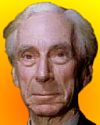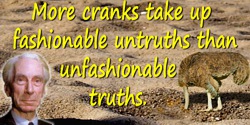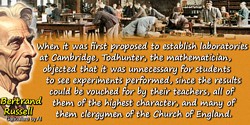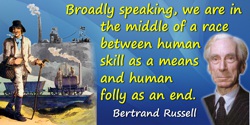 (source)
(source)
|
Bertrand Russell
(18 May 1872 - 2 Feb 1970)
Welsh mathematician, logician and philosopher known for his work in mathematical logic, but was also active in social and political campaigns, advocating pacifism and nuclear disarmament.
|
Bertrand Russell Quotes on Difference (5 quotes)
>> Click for 189 Science Quotes by Bertrand Russell
>> Click for Bertrand Russell Quotes on | Achievement | Aristotle | Arithmetic | Belief | Certainty | Error | Fact | Knowledge | Law | Life | Logic | Mathematics | Method | Mind | Mistake | Observation | Philosopher | Philosophy | Power | Science | Science And Religion | Scientific Method | Truth |
>> Click for 189 Science Quotes by Bertrand Russell
>> Click for Bertrand Russell Quotes on | Achievement | Aristotle | Arithmetic | Belief | Certainty | Error | Fact | Knowledge | Law | Life | Logic | Mathematics | Method | Mind | Mistake | Observation | Philosopher | Philosophy | Power | Science | Science And Religion | Scientific Method | Truth |
One of the main purposes of scientific inference is to justify beliefs which we entertain already; but as a rule they are justified with a difference. Our pre-scientific general beliefs are hardly ever without exceptions; in science, a law with exceptions can only be tolerated as a makeshift. Scientific laws, when we have reason to think them accurate, are different in form from the common-sense rules which have exceptions: they are always, at least in physics, either differential equations, or statistical averages. It might be thought that a statistical average is not very different from a rule with exceptions, but this would be a mistake. Statistics, ideally, are accurate laws about large groups; they differ from other laws only in being about groups, not about individuals. Statistical laws are inferred by induction from particular statistics, just as other laws are inferred from particular single occurrences.
— Bertrand Russell
The Analysis of Matter (1927), 191.
Persecution is used in theology, not in arithmetic, because in arithmetic there is knowledge, but in theology there is only opinion. So whenever you find yourself getting angry about a difference of opinion, be on your guard, you will probably find, on examination, that your belief is going beyond what the evidence warrants?
— Bertrand Russell
In An Outline of Intellectual Rubbish (1943), 22.
The significance of a fact is relative to [the general body of scientific] knowledge. To say that a fact is significant in science, is to say that it helps to establish or refute some general law; for science, though it starts from observation of the particular, is not concerned essentially with the particular, but with the general. A fact, in science, is not a mere fact, but an instance. In this the scientist differs from the artist, who, if he deigns to notice facts at all, is likely to notice them in all their particularity.
— Bertrand Russell
In The Scientific Outlook (1931, 2009), 38.
There is as much difference between a collection of mentally free citizens and a community molded by modern methods of propaganda as there is between a heap of raw materials and a battleship.
— Bertrand Russell
From An Outline of Intellectual Rubbish (1937, 1943), 9. Collected in The Basic Writings of Bertrand Russell (2009), 61.
This method is, to define as the number of a class the class of all classes similar to the given class. Membership of this class of classes (considered as a predicate) is a common property of all the similar classes and of no others; moreover every class of the set of similar classes has to the set of a relation which it has to nothing else, and which every class has to its own set. Thus the conditions are completely fulfilled by this class of classes, and it has the merit of being determinate when a class is given, and of being different for two classes which are not similar. This, then, is an irreproachable definition of the number of a class in purely logical terms.
— Bertrand Russell
The Principles of Mathematics (1903), 115.
See also:
- 18 May - short biography, births, deaths and events on date of Russell's birth.
- Bertrand Russell - context of quote “A process which led from the amoeba to man” - Medium image (500 x 350 px)
- Bertrand Russell - context of quote “A process which led from the amoeba to man” - Large image (800 x 600 px)



 In science it often happens that scientists say, 'You know that's a really good argument; my position is mistaken,' and then they would actually change their minds and you never hear that old view from them again. They really do it. It doesn't happen as often as it should, because scientists are human and change is sometimes painful. But it happens every day. I cannot recall the last time something like that happened in politics or religion.
(1987) --
In science it often happens that scientists say, 'You know that's a really good argument; my position is mistaken,' and then they would actually change their minds and you never hear that old view from them again. They really do it. It doesn't happen as often as it should, because scientists are human and change is sometimes painful. But it happens every day. I cannot recall the last time something like that happened in politics or religion.
(1987) -- 


